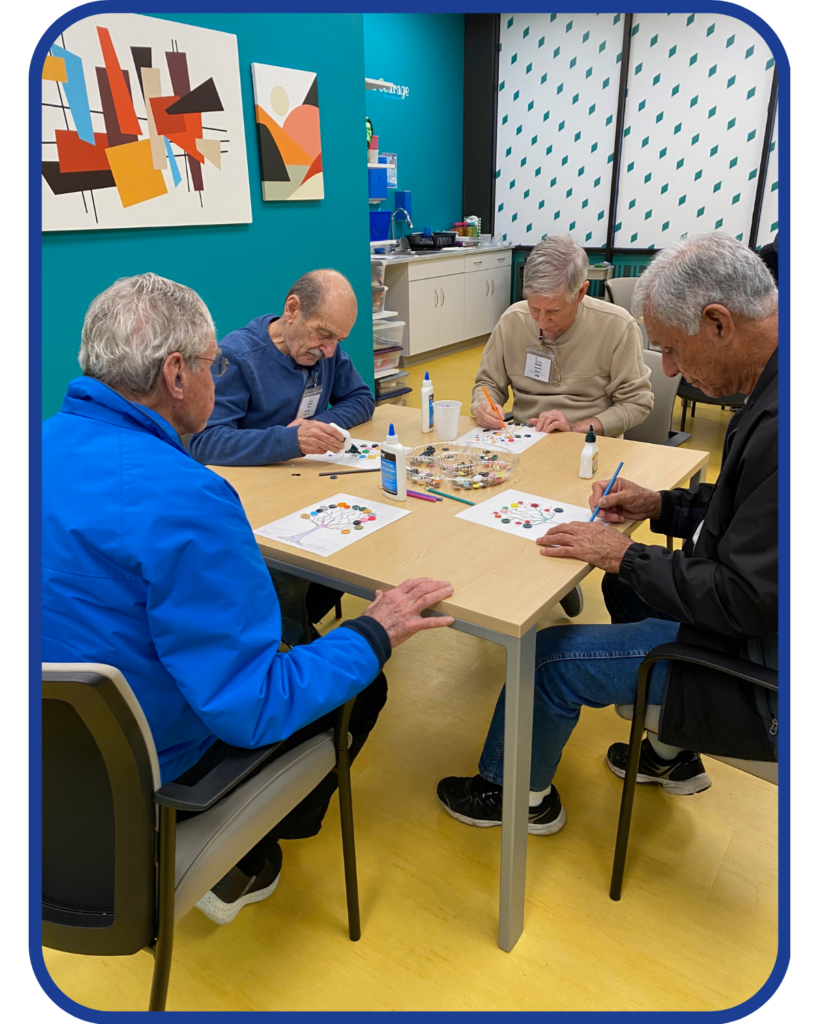From Independence to Empowerment: Strategies for Helping Seniors Thrive Amidst Age-Related Transitions
Supporting Seniors Through Age-Related Transitions
Navigating the aging process can be challenging, especially for seniors who have enjoyed independence most of their lives. Recognizing and addressing the various transitions they face is crucial, and providing support with a kind and understanding tone can make a significant difference.
![an older female adult holds a fall craft she created at the adult day program she attends]() Types of Transitions Seniors Face
Types of Transitions Seniors Face
Seniors encounter a myriad of transitions as they age—some apparent, while others are subtler. Understanding these changes is crucial for providing meaningful support. The transitions include:
Loss of Privacy: As others become more involved in care, seniors may experience a reduction in their personal space and privacy.
Seeking Assistance: The need to ask for help, whether for daily tasks or getting to places, can be a challenging adjustment.
Inconvenience in Seeking Support: Seniors may grapple with the idea of inconveniencing others by seeking assistance, leading to feelings of vulnerability.
Limitations in Hobbies and Activities: The inability to participate in beloved hobbies or activities can be emotionally taxing.
Reliance on Others for Memory and Decisions: Seniors may find themselves relying on others to remember important information and make decisions.
Difficulty in Memory Retention: The challenge of keeping track of essential information and memories can be frustrating.
Grief and Loss: Witnessing peers move to care facilities or pass away can evoke feelings of grief and loss.
Loss of Control Over Diet and Schedule: Seniors may experience reduced control over their diet and daily schedule.
Dependence on Professional Caregiving: In situations where professional caregiving is required, seniors might have to depend on strangers for their well-being.
Understanding the nuances of these transitions lays the groundwork for providing targeted and empathetic support as seniors navigate the aging process. (Bay Area Senior Care)
Tips for Supporting Seniors in Transition
As seniors grapple with the complexities of aging, they may experience a mix of emotions, including grief, depression, and anxiety. It is essential to approach these transitions with empathy and practical strategies:
- Empower Autonomy – Extend as much autonomy as is safe and healthy, allowing seniors to maintain a sense of control.
- Inclusive Conversations – Include seniors in discussions about care plans and preferences, valuing their input.
- Gradual Assistance – Introduce the idea of assistance gradually, starting with smaller tasks for short periods to make the transition smoother.
- Provide Reasons – Communicate the need for assistance with reasons that resonate, such as expressing concern for their well-being or a desire to help with housekeeping.
- Medical Recommendations – When discussing transitions, reference authoritative figures like doctors, emphasizing their recommendations.
- Patient Listening – Be patient and attentive when seniors express concerns and preferences, fostering open communication.
Driving-Related Transition Tips
For seniors facing limits on driving, losing independence can be incredibly challenging. Consider these tips to support them:
Educational Programs: Utilize programs like CarFit to educate seniors on safe driving decisions.
Regular Medical Checkups: Stay proactive with medical tests, including eye exams, to ensure optimal driving capabilities.
Open Dialogue: Engage seniors in conversations about their driving concerns, offering alternatives to maintain their independence. (Guideposts)
Conversation Starters
Initiating conversations about aging and the need for additional support can be delicate. Here are some strategies to help start these discussions:
- Conduct thorough research to provide informed and encouraging options.
- Ask questions grounded in observations, such as acknowledging the challenges of home upkeep.
- Offer practical help, such as suggesting a housekeeper, to gradually introduce the idea of receiving support.
- Ensure seniors are active participants in conversations and decisions about their well-being.
![Town Square Logo]() Caregiver Tip: A Gentle Transition to Adult Day Care
Caregiver Tip: A Gentle Transition to Adult Day Care
The transition to adult day care, especially for those with dementia, requires a thoughtful approach. The Alzheimer’s Association recommends:
-
-
-
- Familiarization: After vetting a center, take your loved one for lunch or an activity to familiarize them with the environment.
- Gradual Engagement: Ease into using the services a few times a week over a month before making a final decision.
- Sensitivity to Resistance: Understand that initial resistance is common, but many participants warm up to the experience over time.
- Flexibility: If the program doesn’t seem suitable initially, consider removing your family member and reintroducing them to it at another time.
-
-
Patience and understanding are key as your loved one adjusts to this new and supportive environment. By approaching age-related transitions with kindness, empathy, and practical strategies, we can create a more supportive and nurturing environment for our seniors. (AARP)



 Types of Transitions Seniors Face
Types of Transitions Seniors Face
 Caregiver Tip: A Gentle Transition to Adult Day Care
Caregiver Tip: A Gentle Transition to Adult Day Care